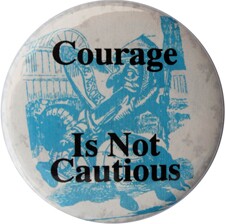The Trouble with Facebook
Courage is Not Cautious
Stock Market Video
In Case You Missed It
---
Talk of Facebook dominated the news cycle for a few days last week. Rightly so too, because the Silicon Valley-based company filed the paperwork for its initial public offering with the SEC. The social networking megalith chose a ticker symbol--FB--and has underwriters, but didn’t state how many shares it planned to offer, what exchange it would trade on, the intended share price or even what date it would launch the IPO. So all we know right now is a Facebook (FB) IPO will happen at some point in the future.
While the financial media spent the first few days of February debating the relative merits of Facebook and making wild predictions about valuations in the $75 billion to $100 billion range, I found myself wondering what type of investor would put money into a Facebook IPO and why. This of course led to a bit of an internal debate on why Facebook is or isn’t a good investment, but I’ll get back to that.
My initial thought on the Facebook investor led down two pathways--growth and value. Growth investors could like Facebook if the stock sees a prolonged upswing after the initial IPO, thus allowing them to sell higher in the not-too-distant future. Should Facebook shares go the other way and remain undervalued for a time after their IPO, then value investors would someday show more interest. The value investor, of course, is someone like Warren Buffet who purchases a stock and holds it for a long time.
Since there hasn’t been any trading in the public sphere yet, however, any argument about how attractive Facebook is to growth or value investors is moot. I do get the sense that the company will pull a Google (GOOG). By that I mean the stock will open high and shoot straight up for some time, because people will want to say they own a piece of Facebook. Soon after, trading will calm down to a more reasonable level.
That people will trade in Facebook stock goes without saying. It is, after all, a very popular company even in its current private state. The issue becomes whether Facebook is or isn’t a good investment for the average investor. To determine this, we first need to figure out what precisely Facebook is. (I told you I’d get back to this.)
Log onto Facebook and you’re immediately greeted with a dashboard of your friends’ activity.
The left navigation menu, underneath the word “facebook,” offers a collection of Favorite links, Groups you belong to, Apps that you’ve installed on your Facebook and Pages that you created for whatever reason.
The central area, beneath the search bar and a miniature of your profile picture, includes notifications, suggestions of people to subscribe to, people you might want to add as friends, the main news feed and some ads.
At the far right side is a constantly updating timeline and a list of friends who are online at any given moment.
As I said, this is the standard screen you see upon logging into Facebook. If you go into another area to play a game such as Words with Friends, Farmville or MobWars, then the interface changes to that of the game.
In this way, Facebook is itself not the product sold by the company Facebook, Inc. Rather, the Facebook that users see when they log into the service is a platform designed to act as a jumping-off point for a variety of different programs. The company itself doesn’t have a defined “product” that it sells to make any sort of profit, or at least not in the traditional sense of the word.
The product that Facebook does happen to offer is access. As a platform, Facebook provides advertisers with access to its 845 million monthly active users. An ad on the Facebook landing page is a highly targeted piece of advertising designed by the purchaser of the ad to be seen only by those people most likely to purchase the product.
Logging into Facebook and creating a profile full of personal information means you’re adding to their product list. And it doesn’t matter if you’re on the website for five seconds, five minutes or five hours. You’ve still given Facebook one more set of eyeballs they can offer advertiser access to. If Facebook is in the business of anything, it’s selling advertisers and game designers access to their users.
Media outlets have said Facebook leads the social networking revolution. I’m not entirely sure I believe that, but one of the things I do know is Facebook has turned itself more and more into a platform that other people can use to offer their product. One of the easiest products I can compare Facebook to is a personal computer. A company like Dell or Compaq builds a personal computer, complete with a monitor, keyboard, mouse and other needed parts, but unless someone adds an Operating System--Windows, Linux or Unix to name just a few--that personal computer is nothing more than a really expensive paperweight.
You can certainly use Facebook without peripherals like Words with Friends, MobWars or Farmville, but without those add-ons, the website becomes something you can get bored of within five minutes of logging on. Sign in, check your friends statuses, comment on a few and bing-bang-boom you’re done. You’re not deeply engaged with Facebook in the way you would be while playing one of those social games, just as you can’t spend hours on a computer without an operating system and programs to run on the operating system.
We’ve established then at last what Facebook is--a platform for other things. Now let’s swing back around to debating whether it’s a good-enough company to invest right off the bat at its IPO.
In the most recent issue of the Cabot Market Letter, Editor Mike Cintolo said that Facebook has a good story behind it and some impressive revenue numbers over the past few years. From those two angles--story and numbers--Facebook is a good investment.
The trouble with Facebook, however, is that it’s still basically an unknown in the investment community. As a company, it can also suffer from something I call the “Tribble effect.” Tribbles, for non-Star Trek fans, are these little balls of fur that do nothing but eat and reproduce. They emit a pleasing trill when petted, which is rather relaxing, but other than that serve no useful purpose.
Facebook suffers from this Tribble effect because, it can be argued, the platform doesn’t serve a “useful purpose.” Yes, it connects people around the world. Yes, it enables companies such as Zynga to sell their social games. Yes, it offers advertisers a chance to get in front of 845 million pairs of eyeballs each month. At the end of the day, however, Facebook’s barriers to entry are not insurmountable. There are other services that might fill the void should Facebook fail.
So is Facebook a good investment? Cabot Market Letter Editor Mike Cintolo, one of our stock experts, believes it’s better to reserve judgment on that score for two to five weeks after the initial public offering. Mike’s reasoning for this is he wants to see a good chart, one which tells him institutional investors are interested in the company.
Mike knows much more about the market than I do, so I’ll defer to him in terms of seeing how Facebook’s chart moves before making a decision whether to invest or not. From a consumer standpoint, I find myself wondering about Facebook’s power to innovate and turn a profit from its embedded advertising. Sure the company had $3.7 billion in revenue in 2011, but they’d have to keep increasing that revenue every year before I’d be totally convinced as to whether the company is a good investment or not.
And now, with social media options like Pinterest, Twitter and Tumblr among others, I find myself wondering how Facebook fits into the industry ecosystem. It’s the granddaddy of the social media industry in a very real sense, but whether acting as a platform or an access point can make it a significant amount of money in the long run remains to be seen.
The trouble with Facebook then, is I don’t know how long it will be until the next big social media website takes its market share away. Remember America Online?
---
Here’s this week’s Contrary Opinion Button. Remember, you can always view all of the buttons by clicking here.
Courage Is Not Cautious
Courage, properly informed, comes from the cultivation of a perspective that is different from that of the “cautious” crowd, and such courage is extremely valuable for investors.
---
In this week’s Stock Market Video, Cabot China & Emerging Markets Report Editor Paul Goodwin talks about the current bull market in domestic and emerging markets stocks. Paul says you need to find stocks to buy, and if your stocks are doing well you need to remind yourself it’s the bull market talking. Featured stocks: BE Aerospace (BEAV), Spirit AeroSystems (SPR), BankRate (RATE), Apple (AAPL), InvenSense (INVN) and CA Inc. (CA). Click below to watch the video!
In case you didn’t get a chance to read all the issues of Cabot Wealth Advisory this week and want to catch up on any investing and stock tips you might have missed, there are links below to each issue.
Cabot Wealth Advisory 2/6/12 - The Perils of a Bull Market
On Monday, Cabot China & Emerging Markets Report Editor Paul Goodwin wrote about the perils inherent in a bull market and the signs you should look for when investing during this time. He also discussed naming conventions when it comes to choosing a company name. Featured stock: NetQin (NQ).
---
Cabot Wealth Advisory 2/9/12 - Happy Fifth Birthday to Cabot Wealth Advisory
On Thursday, Cabot Publisher Timothy Lutts re-ran a favored column from 2009 on the nature of music in human society. Tim discussed the psychology of music and how it related to investing, while also announcing the fifth birthday of this free newsletter. Featured stock: J.C. Penney (JCP).
Yours in investing,
Matt Delman
Editor, Cabot Wealth Advisory
Editor’s Note: Turn your portfolio into a cash machine with an investment in dividend-paying stocks. Every month, we’ll give you the distilled advice of the best minds on Wall Street on which of the dividend-paying stocks you should buy right now. Click here to learn more.


